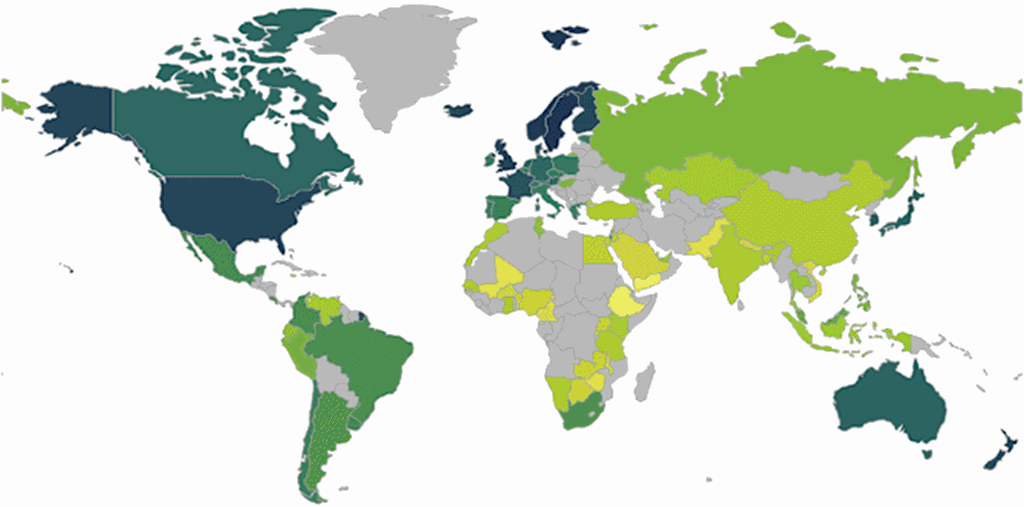UK Retain 3rd Place in 2013 World Index of Internet Growth and Impact

The World Wide Web Foundation, a non-profit organization established by WWW inventor Sir Tim Berners-Lee, has today published its annual 2013 Web Index that ranks 81 countries by broadband access quality, affordability and Internet related policies. Happily the United Kingdom remains in 3rd place and even improved its score slightly.
Once again Sweden comes top with a score of 100 out of 100 and has been labelled as the “best in the world at putting the web to work in 2013“, which is followed by Norway on 97.5 (up from 87.76 in 2012) and the United Kingdom at 95.6 (up from 93.83 last year). Meanwhile others like the United States, which was ranked 2nd in 2012, have fallen down to 4th place (note: they scored higher than 2012 but didn’t rise as fast as the UK or Norway).
Advertisement

Fig.1 2013 Web Index (Dark Blue/Green Colours = Better Web Access)
This year a big focus has been upon the growth in censorship and state surveillance of the Internet, which has seen countries like the UK and USA downgraded due to “inadequate safeguards and due process against government digital surveillance“. But curiously the growing concerns over related issues, such as GCHQ’s mass spying on fibre optic cables (here), has not been enough to drag our overall ranking down.
Globally, however, the report claims that spying and blocking are on the rise. In nearly one in three countries, politically sensitive web content is blocked to a “moderate or severe extent“, and only five countries in the index (6%) meet best practice standards for checks and balances on government interception of electronic communications.
Sir Tim Berners-Lee said:
“One of the most encouraging findings of this year’s Web Index is how the Web and social media are increasingly spurring people to organise, take action and try to expose wrongdoing in every region of the world. But some governments are threatened by this, and a growing tide of surveillance and censorship now threatens the future of democracy. Bold steps are needed now to protect our fundamental rights to privacy and freedom of opinion and association online.”
The report warns that provisions against cybercrime, terrorism, or blasphemy are frequently being employed to “silence legitimate dissent or [for] justifying blanket digital surveillance“.
The 2013 Web Index Top 5 Countries (Score out of 100)
1. Sweden (100)
2. Norway (97.5)
3. United Kingdom (95.6)
4. United States Of America (95.2)
5. New Zealand (92.4)The 2013 Web Index Bottom 5 Countries
81. Yemen (0 LoLz)
80. Ethiopia (1.8)
79. Mail (7.7)
78. Zimbabwe (10.1)
77. Pakistan (10.4)
The 2013 Web Index
http://thewebindex.org
Mark is a professional technology writer, IT consultant and computer engineer from Dorset (England), he also founded ISPreview in 1999 and enjoys analysing the latest telecoms and broadband developments. Find me on X (Twitter), Mastodon, Facebook, BlueSky, Threads.net and Linkedin.
« Big UK Broadband ISPs Block 5 More Video Streaming Piracy Websites






















































Comments are closed